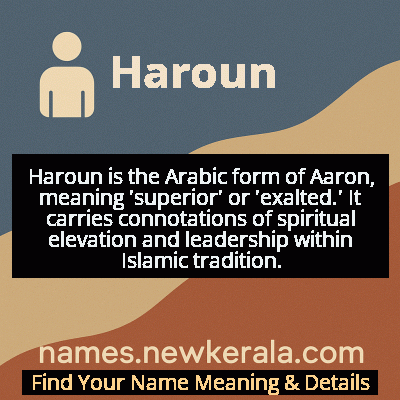Haroun Name Meaning & Details
Origin, Popularity, Numerology Analysis & Name Meaning of Haroun
Discover the origin, meaning, and cultural significance of the name HAROUN. Delve into its historical roots and explore the lasting impact it has had on communities and traditions.
Name
Haroun
Gender
Male
Origin
Muslim
Lucky Number
5
Meaning of the Name - Haroun
Haroun is the Arabic form of Aaron, meaning 'superior' or 'exalted.' It carries connotations of spiritual elevation and leadership within Islamic tradition.
Haroun - Complete Numerology Analysis
Your Numerology Number
Based on Pythagorean Numerology System
Ruling Planet
Mercury
Positive Nature
Adventurous, dynamic, curious, and social.
Negative Traits
Restless, impatient, inconsistent, prone to indulgence.
Lucky Colours
Green, white.
Lucky Days
Wednesday.
Lucky Stones
Emerald.
Harmony Numbers
1, 3, 9.
Best Suited Professions
Sales, marketing, travel, entertainment.
What People Like About You
Versatility, charisma, adventurous spirit.
Famous People Named Haroun
Haroun al-Rashid
Caliph
Ruled during Islamic Golden Age, patron of arts and sciences
Haroun Tazieff
Volcanologist
Pioneering research in volcanology and geothermal energy
Haroun Farocki
Filmmaker
Innovative documentary films exploring media and politics
Harouna Doula
Politician
Significant contributions to youth development in Niger
Name Variations & International Equivalents
Click on blue names to explore their detailed meanings. Gray names with will be available soon.
Cultural & Historical Significance
Across centuries, Haroun has remained a symbol of spiritual authority and cultural heritage in Arabic-speaking communities. The name represents the continuity of prophetic tradition and the importance of family bonds in Islamic values. In contemporary Muslim societies, naming a child Haroun often reflects a desire to connect with this rich historical and religious legacy while honoring the qualities of leadership, wisdom, and moral strength embodied by the original figure. The name serves as a cultural touchstone, linking modern Muslim identity with a venerable tradition of scholarship, leadership, and spiritual devotion.
Extended Personality Analysis
Individuals named Haroun typically exhibit a natural authority combined with thoughtful deliberation, often being perceived as wise beyond their years. They tend to be excellent communicators and mediators, capable of resolving conflicts with diplomacy and patience. This aligns with the historical Aaron's role as spokesperson and peacemaker. Harouns often demonstrate strong moral convictions and a sense of responsibility toward their communities, making them reliable and trustworthy figures in both personal and professional settings.
Their personality often blends traditional values with modern adaptability, allowing them to navigate diverse social contexts with grace. Many Harouns show particular strength in supporting roles, excelling as advisors, teachers, or family pillars rather than seeking the spotlight. They typically possess deep loyalty to family and friends, and their calm demeanor often makes them sought-after for counsel. The combination of spiritual depth and practical wisdom frequently leads Harouns toward professions where they can guide, educate, or protect others, embodying the 'mountain of strength' symbolism inherent in their name's meaning.
Modern Usage & Popularity
In contemporary naming practices, Haroun maintains steady popularity within Muslim communities globally, particularly in the Middle East, North Africa, and among diaspora populations in Europe and North America. While not among the most common Muslim names, it is recognized as a classic, distinguished choice that bridges traditional religious significance with modern international appeal. The name has seen a mild resurgence in recent years as younger Muslim parents seek names with strong cultural roots that also function well in multicultural environments. Its various international forms (Aaron, Harun) contribute to its continued relevance, allowing for cultural adaptation while preserving essential meaning. The name is particularly favored by educated, urban Muslim families who value both religious tradition and global connectivity.
Symbolic & Spiritual Meanings
Symbolically, Haroun represents the convergence of spiritual elevation and earthly leadership. The name embodies the concept of 'exalted' status not through domination but through service and wisdom. It symbolizes the mountain as a place of revelation and strength, reflecting the name's etymological connections to heights and elevation. Haroun also represents the vital role of the supporter and communicator—the person who enables greater missions through loyalty and eloquence. In many cultural contexts, the name carries connotations of bridge-building between divine inspiration and human understanding, between tradition and progress, and between different communities or generations. The symbolic weight extends to family legacy and cultural continuity, often representing the aspiration for children to embody noble qualities of leadership, wisdom, and moral strength while maintaining connection to their heritage.

